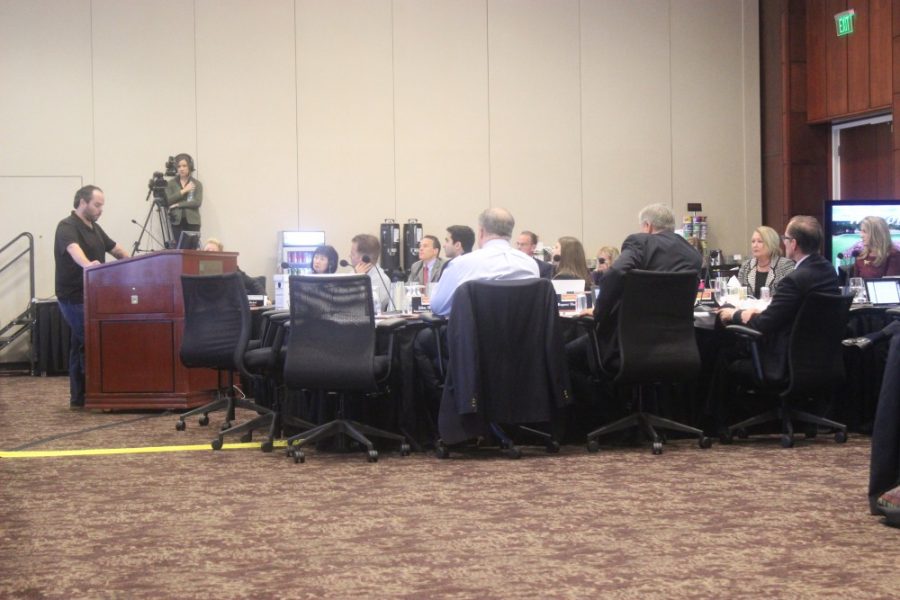FLAGSTAFF — Veterans and cannabis advocates from various backgrounds rallied together at the Arizona Board of Regents meeting on Thursday morning and called upon the regents to reinstate Dr. Sue Sisley.
The audience members were invited to voice their concerns and share their stories during the call-to-audience session at the start of the second day of the board of regents meeting, which was held at Northern Arizona University.
The members’ concerns centered around the termination of Sisley’s contract over the summer. Prior to which, she was conducting research on medical marijuana and its effect as a treatment for post-traumatic stress disorder. Since the termination of her contract, her research has been halted.
The eight audience members advocating for Sisley’s reinstatement spoke during the latter half of the call-to-audience session. Each person had three minutes to speak.
The opening speaker for this part of the session was Ricardo Pareyda, a veteran who served in the U.S. Army Military Police Corps. He shared how he was deployed during Operation Iraqi Freedom, and the effects fighting in the war had on him when he returned home.
“Internalizing these feelings, my struggle began to manifest itself in the form of inexplicable fits of rage, intense panic attacks, insomnia and an emotional numbness that is impossible to describe,” Pareyda said.
Pareyda added that he was diagnosed with PTSD in 2006 and was soon labeled as unemployable. In 2010, Pareyda began his education at the UA and got involved with Veterans Education and Transition Services. He said he attributes this turnaround to medical marijuana in overcoming PTSD.
Pareyda addressed Michael Crow, Arizona State University president, to allow Sisley to continue her research there.
The mood of the room took a more emotional tone as the second speaker, Sean Kiernan, a U.S. Army veteran, read a letter he addressed to the regents. Kiernan requested an independent review of Sisley’s contract termination.
Kiernan began by emphasizing that Sisley’s research centered around the use of cannabis to relieve PTSD symptoms, especially suicide. According to Kiernan, 22 percent of veteran deaths in this country are because of suicide.
“This board cannot ignore the pragmatic realities that accompany the termination of Dr. Sue’s research she was prepared to conduct,” Kiernan read.
In his letter, Kiernan also read that there were reports of political interference in the decision to to not renew Sisley’s contract at the UA. He addressed Ann Weaver Hart, UA president, and said that there were known conversations between Hart and lobbyists.
Chris Sigurdson, senior associate vice president of university relations at the UA, dismissed what Kiernan read in his letter. Sigurdson said the administration was in close communication with human resources during the time of Sisley’s termination.
“There was no political pressure to curtail the research,” Sigurdson said.
Sigurdson added that the UA is ready to host the research project with a different chief scientist, but that the Multidisciplinary Association for Psychedelic Studies declined to do so. According to Sigurdson, MAPS holds the federal approval to obtain and use marijuana for the study.
“These are informed, passionate people,” Sigurdson said, “and we agree — there needs to be more research.”
Non-veterans also took the opportunity to address their concerns to the board. Karen Ross-Glaser shared her history, as well as her family’s history, of PTSD and how medical marijuana has helped her life.
Ross-Glaser said if it wasn’t for cannabis, she would still be in a wheelchair and unable to leave the house because of anxiety.
Some audience members indicated their encouragement by how the board listened to them. Ray Chubb, a full-time activist for cannabis reform, said he thinks the people who came to address the board placed enough pressure to at least continue the conversation about Sisley’s research.
Kiernan said it was to his understanding that the state tried to prevent the veterans from coming to the board meeting to voice their concerns to the regents by threatening to putting a permanent halt on the research.
“We know that Crow had at least expressed some interest in potentially bringing on the study [to] Arizona State,” Kiernan said. “But it’s been weeks and weeks and weeks, and they’ve kind of discussed with no visible or verbal expressed intention to take it seriously.”
The ultimate drawback of the situation, Kiernan said, is that it delays the advancement of the study. Kiernan added that the overall goal is to bring awareness to the issues at hand and promote the science behind it.
“Our so-called leaders in Arizona are intentionally blocking life-saving research,” Pareyda said.
_______________
Follow Meghan Fernandez on Twitter @MeghanFernandez









